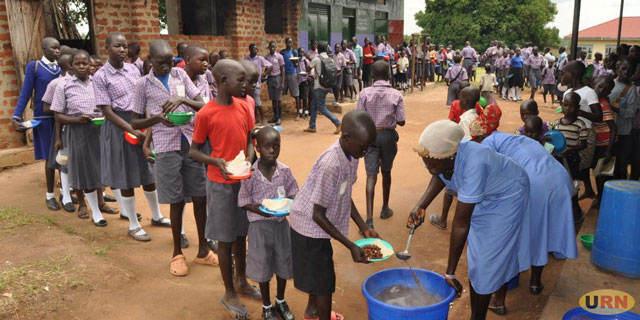Kampala, Uganda | THE INDEPENDENT | The Constitutional Court has issued a directive for the Ugandan government to clarify its failure to supply meals to students in public schools, particularly those enrolled in the Universal Primary Education (UPE) and Universal Secondary Education (USE) initiatives. The court has given the government a five-day deadline to respond to these allegations.
This ultimatum follows a petition submitted in 2023 by the Centre for Food and Adequate Living Rights (CEFROHT), which accused the government of neglecting vulnerable children in the education system. The petition aims to compel the state to fulfill its constitutional obligations by implementing and enforcing a national school feeding policy targeted at the most at-risk students.
The panel of judges, headed by Deputy Chief Justice Flavian Zeija, has made it clear that if the government fails to respond within the stipulated time, a judgment will be rendered based solely on the arguments presented by the petitioners.
David Kabanda, the executive director of CEFROHT, highlighted the seriousness of the situation, stating, “We filed this case for the 66% of Uganda’s schoolchildren who spend an entire day in school without food.” He further emphasized that many of these children are facing serious health issues due to inadequate nutrition, including ulcers and chronic diseases. “Some are orphans, while others come from families that struggle to provide even a single meal a day,” he added.
Kabanda pointed out that the organization is not seeking to provide meals for every child in Uganda, but rather to address the needs of the most impoverished households, including orphans and those living in extreme poverty. “Education is a right that cannot be fully realized on an empty stomach,” he asserted.
The petition draws attention to alarming government statistics indicating that two-thirds of children in Uganda’s public schools do not receive food during the school day, a condition that undermines educational outcomes and contributes to high dropout rates, the rise of street children, and perpetuation of poverty cycles.
“UPE was introduced to acknowledge that many families cannot afford education. However, what about feeding these children while they are at school? What about the orphaned child who has no parent to provide lunch?” Kabanda questioned.
Joan Kembabazi, who leads social justice and strategic litigation at CEFROHT, clarified that the petition is not intended to be confrontational but is part of a larger effort to advocate for equitable public policies. “We do not approach the court as adversaries to the government. Rather, we utilize legal avenues to ensure that government policies are just and uphold the constitutional rights of vulnerable populations,” she remarked.
Kembabazi noted that since the filing of the case in 2023, the organization has encountered delays due to the government’s lack of engagement. Although an initial response was filed, the government failed to attend three scheduled court sessions, leading CEFROHT to request that the court proceed without further government input. The court has now permitted one final opportunity for the state to provide its response before a ruling is made.
“This issue cannot be delayed,” she stated. “Children are currently going hungry. Every day that passes without action exacerbates inequality and denies children their right to learn with dignity.”
The existing education policy, as outlined in the School Feeding Guidelines for UPE and USE, places the responsibility of feeding children entirely on parents. Critics argue that this approach overlooks social realities, especially for the increasing number of children from child-headed households, orphans, and families living below the poverty line. The petitioners assert that even a basic government-supported meal program for the most disadvantaged children could significantly promote educational and health equity.
“Many of these children live in rental slums where their families lack stable income or even a garden. Expecting these parents to provide daily meals while the government withdraws is essentially punishing children for their circumstances,” Kabanda concluded.








Comments (0)
Leave a Comment
Be the first to comment on this article!